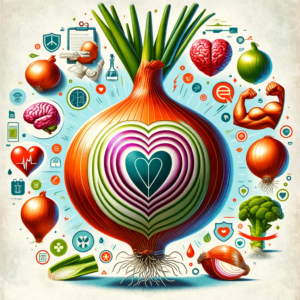Have you ever wondered why do onions make you cry? Every home cook and chef has experienced it: the involuntary tears that come from chopping onions. This common kitchen occurrence, often a source of amusement and annoyance, is a fascinating interplay of chemistry, botany, and human biology. In this article, we’ll explore the reasons behind this phenomenon and offer insights into the science of onions and tears.
Chemical Composition of Onions
The key to understanding why onions make us cry lies in their chemical structure. Onions contain a variety of sulfur-containing compounds. When an onion is intact, these compounds are safely stored in separate compartments within the onion’s cells. However, when we cut into an onion, we break these cells, causing a chemical reaction.
The Science Behind the Tears

The primary culprit for our tears is a substance called syn-Propanethial-S-oxide. When an onion is chopped, enzymes that were previously separated mix with the sulfenic acids in the onion to produce this volatile compound. Once formed, it quickly evaporates and reaches our eyes.
Biological Response to Onion Enzymes
Upon reaching our eyes, syn-propanethial-s-oxide reacts with the water in our tear films to form sulfuric acid. This mild acid irritates the sensory neurons in our eyes, prompting a stinging sensation. Our body’s natural defense mechanism against this irritation is to produce tears, attempting to wash away the irritant.
Types of Tears: Emotional vs. Reflex
It’s important to differentiate between the tears caused by onions (reflex tears) and those evoked by emotions (emotional tears). Reflex tears are produced to protect the eye, while emotional tears are triggered by feelings like sadness, joy, or frustration. The composition of these tears also varies, with emotional tears containing more hormones.
Preventive Measures and Techniques
Fortunately, there are several methods to minimize or prevent tearing up while cutting onions. Chilling onions before chopping slows down the chemical reactions, reducing the amount of syn-Propanethial-S-oxide released. Using a sharp knife minimizes cell damage, and cutting onions under a vent or near a fan can help disperse the irritant gases.
The Impact of Onion Varieties
Not all onions are created equal in their tear-inducing potential. Varieties like sweet onions have fewer sulfur compounds, making them less likely to cause tears. In contrast, older or more pungent onions, like red or yellow varieties, tend to have higher levels of these compounds.
Onions in Cooking and Culture
Onions, with their unique blend of sweetness and pungency, have been a cornerstone in culinary traditions around the globe for centuries. More than just a kitchen staple, onions carry a rich cultural significance, symbolizing layers of history and tradition in many societies.
In cooking, onions are celebrated for their versatility. They form the foundational flavor base in a myriad of dishes, from the classic French mirepoix to the aromatic Indian masalas. Whether caramelized to bring out a deep, sweet flavor, sautéed to add a subtle piquancy, or used raw in salads and salsas for a crisp bite, onions have the unique ability to transform and elevate a dish.
Culturally, onions have been revered since ancient times. In Egypt, they were worshiped for their spherical shape and concentric rings, symbolizing eternal life. Across the world, from the Americas to Asia, onions have been used in traditional medicine, believed to possess healing properties ranging from cold prevention to heart health benefits.
Onions also feature in numerous cultural rituals and festivals, signifying prosperity, protection, and health. This universal ingredient, transcending culinary boundaries, not only enriches our palates but also connects us to a shared human heritage, underscoring the profound impact of a simple, humble vegetable on our lives.
Health Benefits of Onions

Onions, a staple ingredient in kitchens around the world, are not only prized for their flavor but also for their impressive health benefits. Packed with vitamins, minerals, and potent plant compounds, these humble bulbs are more than just culinary delights; they’re a powerhouse of nutrition and health-promoting properties. In this comprehensive overview, we’ll explore the various health benefits that onions offer.
- Rich in Nutrients
- Onions are low in calories yet high in vitamins and minerals.
- They are a good source of vitamin C, a potent antioxidant that supports the immune system, skin health, and collagen production.
- Onions also contain vitamins B6 and B9 (folate), which play key roles in metabolism, red blood cell production, and nerve function.
- Heart Health Benefits
- Regular consumption of onions may support heart health.
- They contain antioxidants and compounds that fight inflammation, reduce cholesterol levels, and decrease triglycerides.
- Certain sulfur compounds in onions can lower blood pressure, reducing the risk of heart disease.
- Cancer-Fighting Properties
- Onions are rich in antioxidants and sulfur-containing compounds, which have been linked to a reduced risk of certain cancers.
- Studies suggest that onion consumption may particularly help lower the risk of colorectal, stomach, and prostate cancers.
- Blood Sugar Regulation
- Onions may help control blood sugar, which is especially significant for people with diabetes or prediabetes.
- The sulfur compounds and quercetin in onions can help regulate blood sugar levels.
- Bone Health
- Studies have suggested that onions may boost bone density and reduce oxidative stress, beneficial for osteoporosis prevention and overall bone health.
- Women who eat onions regularly may have a lower risk of hip fracture.
- Digestive Health
- Onions are rich in fiber and prebiotics, essential for gut health.
- Prebiotics in onions, such as inulin and fructooligosaccharides, promote the growth of beneficial gut bacteria and improve digestion.
- Anti-Inflammatory and Antibacterial Properties
- Onions have anti-inflammatory properties that can benefit those with inflammatory conditions like arthritis.
- They also possess antibacterial properties and can fight against bacteria like Escherichia coli (E. coli), Pseudomonas aeruginosa, and Staphylococcus aureus.
- Improvement of Immune Function
- The phytochemicals in onions act as powerful antioxidants, protecting the body against free radicals.
- Regular consumption of onions can strengthen the immune system.
- Skin and Hair Health
- The rich supply of vitamins and sulfur compounds in onions can contribute to healthy skin and hair.
- Applied topically, onion juice has been used in traditional medicine to treat hair loss.
- Aids in Sleep and Mood
- Onions are rich in prebiotics, which can improve sleep and even reduce stress.
- Prebiotics may aid in regulating mood and reducing the risk of depression.
The next time you find yourself tearing up over an onion, remember that it’s a small price to pay for the flavor and health benefits these remarkable bulbs provide. Understanding the science behind this phenomenon can transform an ordinary kitchen experience into a moment of scientific wonder, deepening our appreciation for the humble onion.
This article offers a comprehensive look at why onions make us cry, blending scientific explanations with practical advice and cultural insights. For SEO optimization, it includes relevant keywords such as “onions and tears,” “chemical composition of onions,” “preventing tears while cutting onions,” and “health benefits of onions,” ensuring it’s informative and engaging for readers seeking to understand this common culinary experience.

